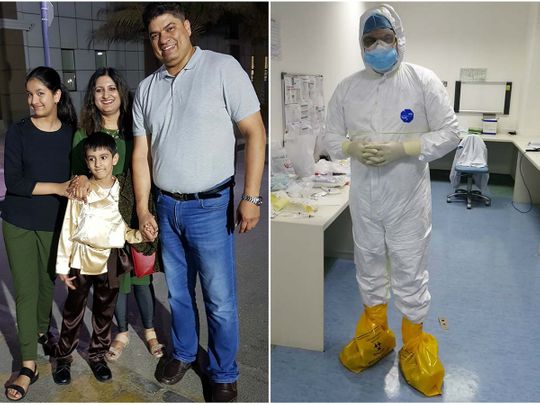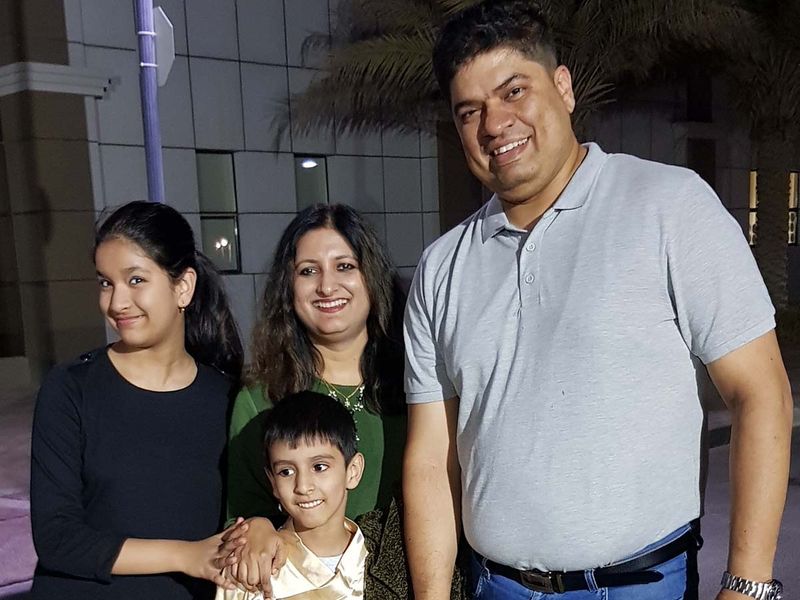
Coronavirus: What's it like for an Abu Dhabi doctor who lives at a hotel away from his family as he treats COVID-19 patients?
Anaesthesia specialist, Dr Pulak Puneet, works closely with COVID-19 patients at an ICU
by Falah Gulzar, Social Media ReporterEveryday Dr Pulak Puneet enters his Abu Dhabi hotel room, carries out his elaborate sanitisation routine and goes to bed without seeing his family, sometimes after 12-hour-long shifts.
Puneet works at a private hospital in the UAE’s Capital as an anaesthesia specialist in the intensive care unit (ICU), where most of the coronavirus patients are admitted in the facility, he said.
The 43-year-old has spent five years practising as a medical professional in the UAE. “But nothing could prepare me for this [COVID-19 outbreak],” he told Gulf News.
The doctor has two children, 12-year-old daughter, Shaaranya Sinha, and six-year-old son, Adhrit Sinha, whom he has barely seen since the outbreak.
Adhrit is prone to respiratory infections, which makes Puneet even more cautious as COVID-19 can trigger even more respiratory tract complications.
“I chose to distance myself from my family for their safety,” the Indian national said.
Puneet’s wife, Divya Shree Pulak, is also a medical professional, working as a radiologist at a private hospital in Abu Dhabi.

“She also works with coronavirus patients but not as directly as I do,” he said.
As the duo work in the same industry, Divya Shree has been especially understanding of Puneet’s decisions. “She has also helped my children understand, who have been very mature throughout,” he said.
Puneet is currently living in a hotel near his home to not expose his family to coronavirus as he works with patients of the disease very closely. However, it has come at the expense of his mental wellbeing.
He goes every day to his house and picks up dinner from the basement, which one of the family members leaves behind.
“I was so depressed not seeing my children and wife. It was taking a toll on me,” he said.
Now, after days of not seeing his loved ones, Puneet goes home weekly to have dinner with the family after taking precautionary measures.
“I carry out my sanitisation ritual at the hotel and go home for dinner from time to time. I cannot explain the sense of refreshment I felt when I first did that in days. I need it,” he said.
Talking about adjusting to the changes, Puneet said: “It was either that I put my hands in the air and say ‘I cannot do it’ or think of solutions.”
“I had to accept the reality and get on with it. I had to, of course, address personal safety concerns, and those of my loved ones. I had to find a way forward. Have faith,” he added.
“There were days when I wanted to quit…”
It was not just staying away from his family that was bothering him but also the sheer amount of work and stress was getting to him.
Talking about how he felt when coronavirus patients first started coming into the hospital, he said: "Days passed and seeing the impact of the illness on patients, I was mentally scarred and physically drained at the end of each duty. I was even pushed to consider quitting working and giving it all up.
“But I had to gather myself. I had to come to terms with the situation. This was no solution. To quit? I have never been a quitter. Plus the most important question ‘If not me, who?’” he said.
Talking about the efforts of frontliners working selflessly in the UAE and around the world, he said: “What if everyone decided to quit?”
Impressed by UAE’s approach
The medical professional worked in India prior to coming to the UAE and has practised for 15 years altogether.
“The way that we have dealt with the pandemic in the UAE has been impressive. Even at the facility I work at, we have had an organised approach. We prioritise high-risk patients,” he said.
As time passed, Puneet said that the doctors in the UAE, like him, got more used to dealing with the pandemic. However, it took some time “getting used to it as it is in fact an unprecedented crisis”, he said.
Talking about how the world has dealt with the outbreak, Puneet said: “It is definitely something no country was fully ready for, it happened so fast. But when I talk to my friends working elsewhere, like in the US, there were times it was complete mayhem for them,” he said.
The doctor has urged people in the UAE to “do their part” in curbing the spread of COVID-19 and flattening the curve, so all can get some relief.
“If the virus chooses to be nasty it can get very bad. It is worth taking all the precautions the authorities are asking for, not only for yourself but your family too,” he said.